Choosing a Gaming CPU at 1440p: Adding in Haswell
by Ian Cutress on June 4, 2013 10:00 AM ESTCivilization V
A game that has plagued my testing over the past twelve months is Civilization V. Being on the older 12.3 Catalyst drivers were somewhat of a nightmare, giving no scaling, and as a result I dropped it from my test suite after only a couple of reviews. With the later drivers used for this review, the situation has improved but only slightly, as you will see below. Civilization V seems to run into a scaling bottleneck very early on, and any additional GPU allocation only causes worse performance.
Our Civilization V testing uses Ryan’s GPU benchmark test all wrapped up in a neat batch file. We test at 1440p, and report the average frame rate of a 5 minute test.
One 7970
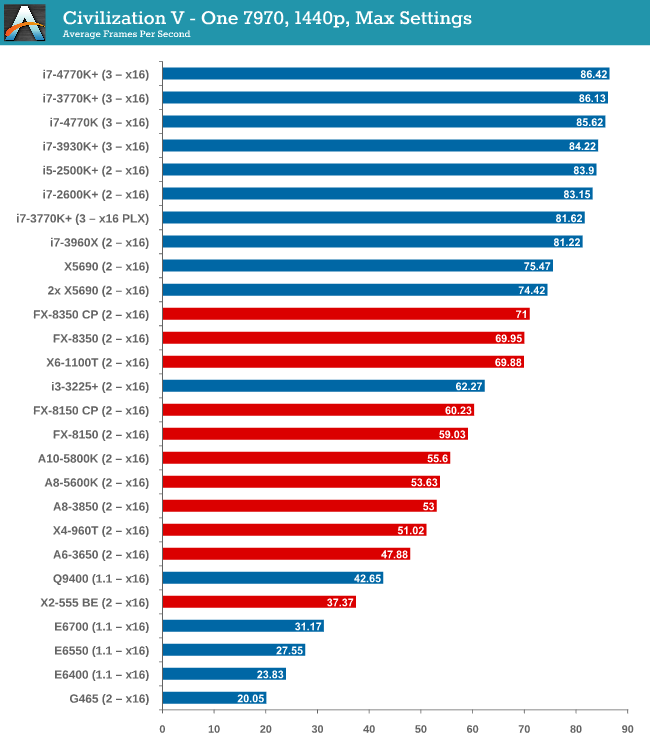
Civilization V is the first game where we see a gap when comparing processor families. A big part of what makes Civ5 perform at the best rates seems to be PCIe 3.0, followed by CPU performance – our PCIe 2.0 Intel processors are a little behind the PCIe 3.0 models. By virtue of not having a PCIe 3.0 AMD motherboard in for testing, the bad rap falls on AMD until PCIe 3.0 becomes part of their main game.
Two 7970s
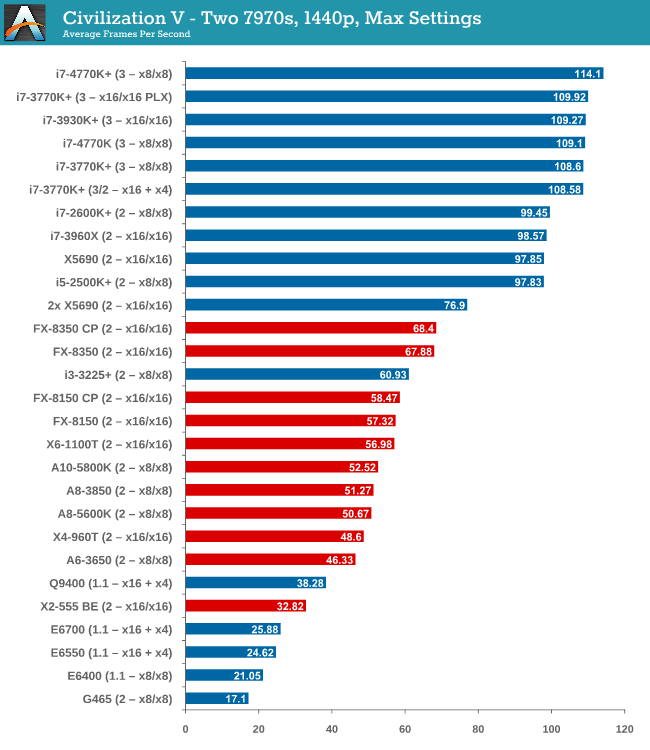
The power of PCIe 3.0 is more apparent with two 7970 GPUs, however it is worth noting that only processors such as the i5-2500K and above have actually improved their performance with the second GPU. Everything else stays relatively similar.
Three 7970s
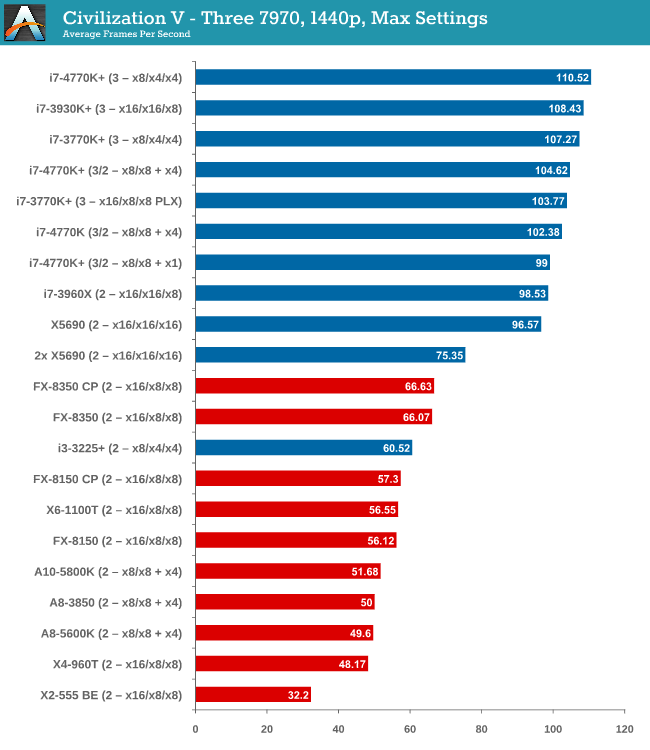
More cores and PCIe 3.0 are winners here, but no GPU configuration has scaled above two GPUs.
Four 7970s
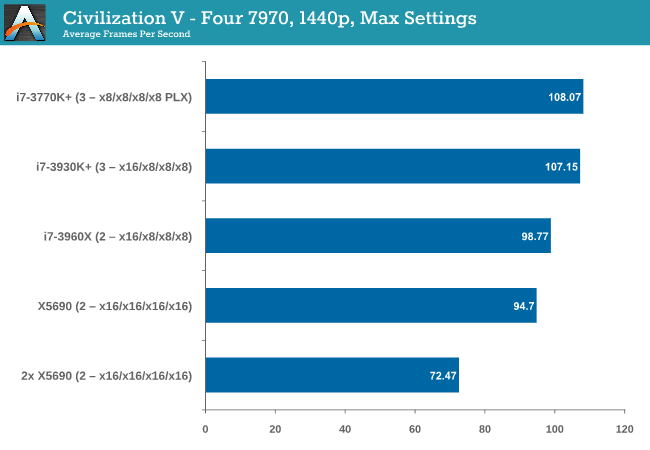
Again, no scaling.
One 580
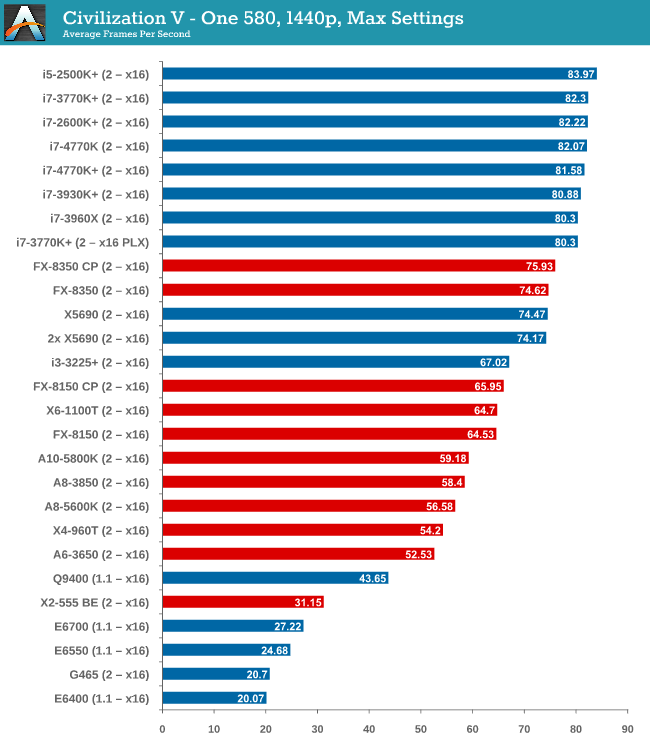
While the top end Intel processors again take the lead, an interesting point is that now we have all PCIe 2.0 values for comparison, the non-hyper threaded 2500K takes the top spot, 10% higher than the FX-8350.
Two 580s
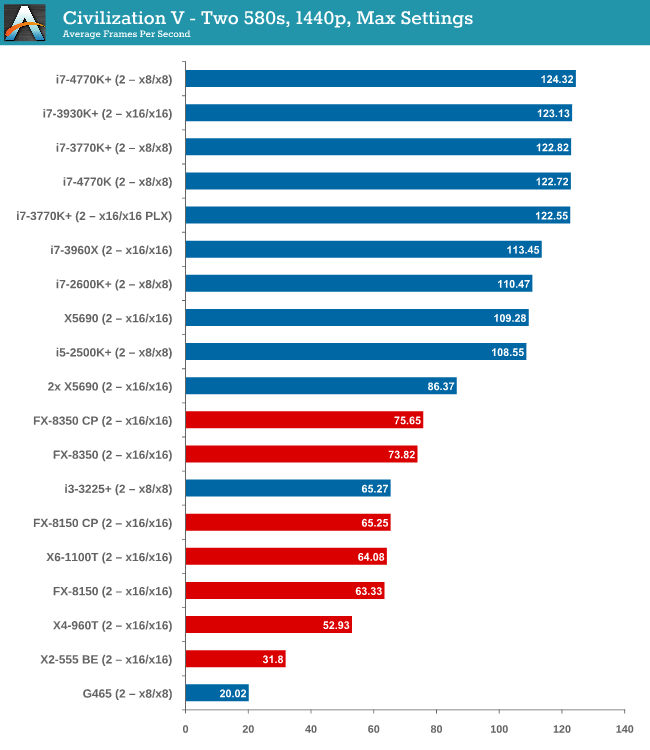
We have another Intel/AMD split, by virtue of the fact that none of the AMD processors scaled above the first GPU. On the Intel side, you need at least an i5-2500K to see scaling, similar to what we saw with the 7970s.
Civilization V conclusion
Intel processors are the clear winner here, though not one stands out over the other. Having PCIe 3.0 seems to be the positive point for Civilization V, but in most cases scaling is still out of the window unless you have a monster machine under your belt.










116 Comments
View All Comments
majorleague - Wednesday, June 5, 2013 - link
Here is a youtube link showing 3dmark11 and windows index rating for the 4770k 3.5ghz Haswell. Not overclocked.This is apparently around 10-20fps slower than the 6800k in most games. And almost twice the price!!
Youtube link:
http://www.youtube.com/watch?v=k7Yo2A__1Xw
kilkennycat - Wednesday, June 5, 2013 - link
Quote:" The only way to go onto 3-way or 4-way SLI is via a PLX 8747 enabled motherboard, which greatly enhances the cost of a motherboard build. This should be kept in mind when dealing with the final results."The only way? X79 supports up to 4 8X channels of PCie 2/3.
The 4-core 3820 overclocks readily and on a X79 board is a very small cost enhancement
over a high-end non-PLX8747 1155-socket setup. Plus the upgrade benefit of stepping up to the 6-core 3930K if one wants to combine usage for professional multicore applications with gaming.
random2 - Wednesday, June 5, 2013 - link
"What we see is 30.73% of gamers running at 1080p, but 4.16% of gamers are above 1080p."So an article and benches are provided for the benefit of 4.16% of the gamers who might be running more pixels vs the 65% (almost 3 million) lions share of gamers that must be running at fewer pixels than found at 1080p. Very strange.
Dribble - Thursday, June 6, 2013 - link
Just to point out the blindingly obvious but who would spend big $$$ on a 1440p monitor and a top end gpu and then buy a low end budget cpu (A8-5600)...The realistic min recommendation is going to be a i3570K.
xineis - Thursday, June 6, 2013 - link
So, how would a 955BE perform compared to the CPUs on the test? From what I understand, I should just keep this CPU, as a new one is not going to make much of a difference?Zoatebix - Friday, June 7, 2013 - link
Thank you for doing all this work. A great follow-up to the original!Could you please correct some charts on the CPU Benchmarks page, though? The "Video Conversion - x264 HD Benchmark" section is displaying the charts for the "Grid Solvers - Explicit Finite Difference" section.
Klimax - Saturday, June 8, 2013 - link
Frankly not best article. Resolution too high for GPU and then recommending CPU based on it. CPU, which will not provide performance needed for games. (Techreport showed that APU is not good idea when paired with real GPU; FPS might be in range, but latency is in hell)JNo - Sunday, June 9, 2013 - link
Ian, I'm afraid I have to agree with some of the naysayers here. You've tried so hard to have clean *scientific* analysis that you've failed to see the wood for the trees. In actual fact I fear you've reached the opposite of a scientific conclusion *because* you only focussed on easily obtainable/reproducible results.Just because results for modern games are hard to obtain, doesn't mean you can ignore them despite it being a hard path to walk. I have 1440p but agree that it's not relevant to the vast majority and anyone affording a 1440p monitor won't care to save $40 on AMD A8 vs core i5. So you have to be *realistic* (as well as scientific).
I know from a few years of international finance analysis that when doing an independent study, there is a chance you can come to a conclusion that flies in the face of the market or common opinion. You have to be *SO* careful when this happens and quadruple check what you have ended up with because 99% of the time, the market or 'hive mind' is correct and there is an error or misunderstanding in your own work. After all, the conglomerate conclusion of hundreds of often intelligent people is hardly likely to wrong, even if you are a smart guy. The chance that you have found the truth and that everyone else is wrong really is about 1% (yes it does happen but it is a once in a blue moon type of event).
It might seem a huge hit to admit that much of your hard work was misdirected but it could save more pain in the long run to go back to the drawing board and consider what you are trying to achieve and how best to go about it. A very small sample of older titles at unpopular resolutions really could skew results to be misleading.
CiccioB - Wednesday, June 12, 2013 - link
I agree. However we have still to understand what was the thesis Ian wanted to demonstrate.If it was "AMD CPU don't have to appear so bad vs Intel" the strategy used for the demonstration is quite good.
On the other hand, if it was "Let's see which is the best CPU for playing games" the strategy is a complete fail. And it still is partially the same if it were "Let's see which is the cheapest CPU to cope with a bottlenecked GPU", as those old games, but Civ5, all do not have any complex AI o scripts which are a CPU intensive task .
If I were to judge this work as a homework I would evaluate it as F because it is intended for a small part of the market, using old benchmarks not valid today, incomplete (lack of FCAT) with a wrong setup (bottlenecking GPUs to evaluate CPU performances?).
Wrong on all aspects but, unless said, the intent was to show that AMD CPU are just trailing Intel most expensive ones instead of being a complete generation behind. In this case evaluation can be a B, but becomes quite limited if we look at the represented market (is 3% of a market that is capable of spending well more that an average gamers a good target to demonstrate that they can spare few bucks using an otherwise castrated CPU?)
For all these reasons I may say that this is one of the worst article I have ever read on this site. It show some incompetence or worse a bias.
Filiprino - Thursday, June 20, 2013 - link
It's cool that you test old CPUs, so we can see the improvement of CPU processing power over the years.